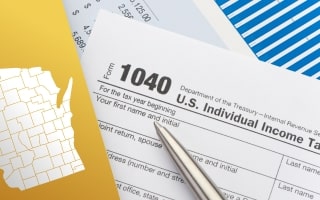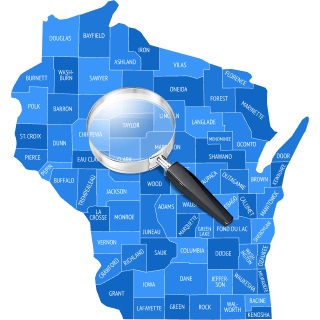Property Tax Records in Wisconsin

Buying a home or a rental property in Wisconsin is an exciting venture, but it comes with the responsibility of paying annual property taxes. These taxes are essential for funding local services such as schools, roads, and public safety. It's important to note that property tax rates can vary significantly from one county to another, which means you should do your research based on the specific area you're interested in.
The state average property tax rate is approximately 1.51%, placing Wisconsin among the states with the highest property tax rates in the nation. For instance, Menominee County stands out with the highest effective tax rate at an alarming 2.93%. This variation can impact your overall budget, so understanding the specific rates and regulations in your desired county is crucial for making informed decisions as a homeowner or real estate investor in Wisconsin.
The method you use to pay your property taxes depends on where you live. In some cities or counties, you'll need to pay the full amount by the end of January. In other locations, you'll be tasked with making your payments in two or four installments between January 31 and July 31. Your annual property taxes are determined based on the tax rate in your district and the assessed value of your home.
Your local or county assessor is required by state law to appraise your home once every five years. A full appraisal may involve a visit to your home to calculate the current market value. However, these values will still be updated annually, which means that your home's assessed value could increase or decrease each year.
Wisconsin started collecting property taxes even before it received statehood in 1848. At the time, however, assessors were elected to their positions, which often resulted in them favoring some constituents over others. The state would eventually direct counties to equalize assessment values. At the turn of the 20th century, control over property tax collections was handed to the statewide Tax Commission.
Property Tax Assessment in Wisconsin

Your home's assessed value will be calculated every year by a local assessor that's part of your tax district. The assessed value can differ from the market value. In general, an assessed value should be equal to the market value. However, it can vary based on where you live. The state average is just over 93%.
Let's say that your home's market value is $200,000. If you live in a county with a 0.95 assessment ratio, your home's assessed value will be $190,000. Your taxes will be based on this amount. Keep in mind that it's possible for incorrect home values to be appealed to the Board of Assessors or Board of Review.
The tax rate that's applied to your property depends on the city or county you live in. Cities, school districts, municipalities, and towns can levy separate taxes that have their own rates. These rates are calculated based on the amount of revenue that the district wants to generate for the year.
Let's say that the levy in your district is $2,000, and the average assessed value of all properties is $200,000. You'll need to divide $2,000 by $200,000, which leads to a rate of 1%. More than a decade ago, Wisconsin passed a law that placed a limit on how much levies can increase from year to year. A tax district can only raise its levy through a public vote or when there's new construction.
When calculating the property taxes for the home you want to buy, consider the tax rate. In Wisconsin, tax rates are displayed in dollars for every $1,000 in assessed value. Each district has its own assessed value, which is why rates aren't always comparable from county to county.
You can perform a simpler calculation by multiplying the market value of your home by the effective tax rate in your county. If your county has an effective tax rate of 1.50%, your annual property taxes will amount to $3,000 on a home with a market value of $200,000. The tax rates in the most populous Wisconsin counties are:
- Milwaukee County: 2.53%
- Dane County: 2.11%
- Waukesha County: 1.40%
- Brown County: 1.83%
- Racine County: 2.07%
Calculate Wisconsin Taxes
In Wisconsin, property taxes are assessed and collected at the local level, with rates varying by county, municipality, and property classification, residential, commercial, or agricultural. A smart way to understand how property taxes are calculated in Wisconsin is by using a property tax calculator. This tool simplifies the process for both homeowners and real estate investors by allowing users to input key property details and estimate their annual tax liability based on local tax rates and any applicable exemptions.
A Wisconsin property tax calculator is especially helpful for estimating your yearly tax obligations and identifying potential savings opportunities. It can assist in uncovering exemptions and tax relief programs, such as the Senior Citizens Property Tax Deferral Program and the Veterans Property Tax Exemption, which reduce the tax burden for qualifying individuals. Additionally, Wisconsin offers various programs that provide property tax relief for low-income homeowners, making the calculator a valuable tool for evaluating your tax benefits and planning for your financial future.
using our property tax calculator.
Wisconsin Property Tax Records: What Are They?

If you own a piece of real estate in Wisconsin, you'll pay annual property taxes. These taxes are used by your local government to pay for public services, parks, roads, schools, and libraries. Technical colleges also receive some of the collected revenues. Your tax bill may include a summary of how these payments are used.
When you're considering buying a Wisconsin home, you can do more research on the property by obtaining its tax records. These records include the latest Wisconsin property tax assessment information as well as many property details. For example, you may find a description of recent renovations and improvements in these documents. This information can typically be accessed through your assessor's website. The report you obtain should include the following details:
-
Assessed and market values for the previous two years
-
Net taxes
-
Property address
-
Zoning
-
Type of property
-
Lot size
-
Architectural style
-
Foundation
-
Year built
-
Square footage
-
Interior information
-
Legal description
-
Previous sales info, which includes date of sale, price, and owner's name
-
Comprehensive tax details
-
Special assessment info
Property Tax Exemptions and Deductions in Wisconsin

Wisconsin provides property owners with a few tax exemptions and deductions that they can apply for. However, not every homeowner qualifies for an exemption. If you claim a tax break on your existing property, you should be able to reduce its assessment value.
Several credits can be automatically applied to your tax bill every year. For example, First Dollar Credit is available to homeowners who make improvements or renovations to their properties. Below are a couple of additional exemptions you might qualify for.
Homestead Tax Credit: This specific tax credit is available to homeowners with low or moderate income. To qualify, you must own and live in a Wisconsin home. Your household income needs to be $24,680 or lower if you wish to claim this credit. Income limits are updated every year.
This credit is also available to disabled individuals and seniors who are at least 62 years old. The amount you receive with this credit depends on your current income as well as the property taxes you're expected to pay. For the 2023 tax year, the maximum credit is $1,168.
Veteran's Exemption: Veterans and their surviving spouses can qualify for this credit. The refundable property tax credit will be applied to your residence as well as one acre of land. To qualify, you must be a Wisconsin resident for at least five consecutive years after being on active duty.
You must have a disability or service-connected disability rating of 100%. If your service-connected disability is anywhere from 40-70%, you may still qualify for the credit based on your employability. Depending on the value of your home and the size of your property, you may be able to eliminate your taxes with this credit.
How To Search Property Tax Records in Wisconsin

Wisconsin property tax records are filled with information that the state makes available to the public, which means that there are several resources you can use to gather this data. Your county or city should provide an online database or portal that allows you to search for any home in the jurisdiction.
In Madison, you're able to search for property records with the address, parcel number, or owner's last name. Your search should lead you to the tax records of the home you're interested in.
You can also look up tax records with PropertyChecker, which allows you to enter the parcel ID, property address, owner name, or email address to conduct searches. This resource has access to the records of 155 million properties around the country. Once you know how to search property tax records in Wisconsin, you should receive the following documents and information:
-
Property tax records
-
Deed records
-
Owner names
-
Previous sales history
-
Loan records, such as lender information and price
-
Current and historical property values
-
Details about the property, which include lot size and square footage
-
Neighborhood information
-
Foreclosure details
-
Building permits
-
Lien records
How To Appeal Property Taxes in Wisconsin

Whenever your home's assessment value changes, you'll receive a notice in the mail that tells you what the new value is. These notices are typically mailed in late April.
If you believe that your home's new valuation is incorrect, you can attempt to appeal your property taxes in Wisconsin. The appeals process can be time-consuming, which is why it's a good idea to know what it entails before you file your appeal.
Step 1: Once you receive a notice that the assessment value of your property has changed, contact your local assessor to discuss the new valuation. They might review your case immediately and make the necessary changes.
If they don't agree to your request, you can file an appeal with your County Board of Assessors. Check your county's website to determine if there are any deadlines you need to adhere to.
Step 2: If your county doesn't have a Board of Assessors, you can appeal to the Board of Review. They'll set a hearing date and inform you well in advance. During the hearing, you'll be expected to present any evidence you have that indicates the assessed value is incorrect.
Step 3: Even if the Board of Assessors or Board of Review doesn't grant your appeal, you still have options. The next step of this process involves appealing to the Wisconsin Department of Revenue. You can even appeal their decision to the Circuit Court.
How Property Tax Records Impact Real Estate Transactions in Wisconsin

Whether you're buying or selling a home in Wisconsin, you'll likely need to consider property taxes. Since Wisconsin has some of the highest property taxes in the country, they will play a role in nearly every real estate transaction.
For example, someone who's looking to buy a home in Wisconsin will need to consider if their estimated property taxes make the purchase too expensive. Keep in mind that an annual tax bill of $3,600 will increase your monthly mortgage payments by $300. A buyer may discover that they're unable to afford a home after factoring in property taxes, mortgage payments, and possible HOA fees.
There's also a chance that the buyer will decide to search for homes in counties with lower tax rates. Even though property tax rates are high in most Wisconsin counties, there are a few places where the rates are close to 1%. A homeowner who lives in a county with a high tax rate may need to reduce their property's listing price to gain offers from potential buyers.
Investors must also consider property taxes before purchasing rental homes. The purpose of buying a rental property is to earn enough income to have a positive cash flow. If an investor is bringing in more money than they're spending every month, the investment will be a success. However, high property taxes will increase the investor's expenses. The only way to counteract this boost in spending is by charging more for rent, which may not be a viable path forward.
If you're thinking of investing in Wisconsin real estate, you may be able to acquire properties through tax sales. A tax sale is a type of public auction that counties can host once every year. Homeowners are tasked with paying their taxes in four installments between January 31 and July 31. If the owner misses any of these payments, their taxes will become delinquent after five business days.
Once taxes become delinquent, interest will start to accumulate. Property owners have two years to pay their outstanding taxes. If this date passes without the taxes being paid in full, the county can begin the process of obtaining the property's title. After gaining the title, the county will sell the property to an investor at a public auction. Keep in mind that the redemption period may be limited to one year.
Free Wisconsin Property Tax Lookup
Tax Records Please wait...
Property Tax Guide
- Property Tax Records in Wisconsin
- Property Tax Assessment in Wisconsin
- Wisconsin Property Tax Records: What Are They?
- Property Tax Exemptions and Deductions in Wisconsin
- How To Search Property Tax Records in Wisconsin
- How To Appeal Property Taxes in Wisconsin
- How Property Tax Records Impact Real Estate Transactions in Wisconsin
Instant Access to Wisconsin Property Records
- Owner(s)
- Deed Records
- Loans & Liens
- Values
- Taxes
- Building Permits
- Purchase History
- Property Details
- And More!
Free Wisconsin Property Tax Lookup
Tax Records Please wait...
Property Tax Guide
- Property Tax Records in Wisconsin
- Property Tax Assessment in Wisconsin
- Wisconsin Property Tax Records: What Are They?
- Property Tax Exemptions and Deductions in Wisconsin
- How To Search Property Tax Records in Wisconsin
- How To Appeal Property Taxes in Wisconsin
- How Property Tax Records Impact Real Estate Transactions in Wisconsin